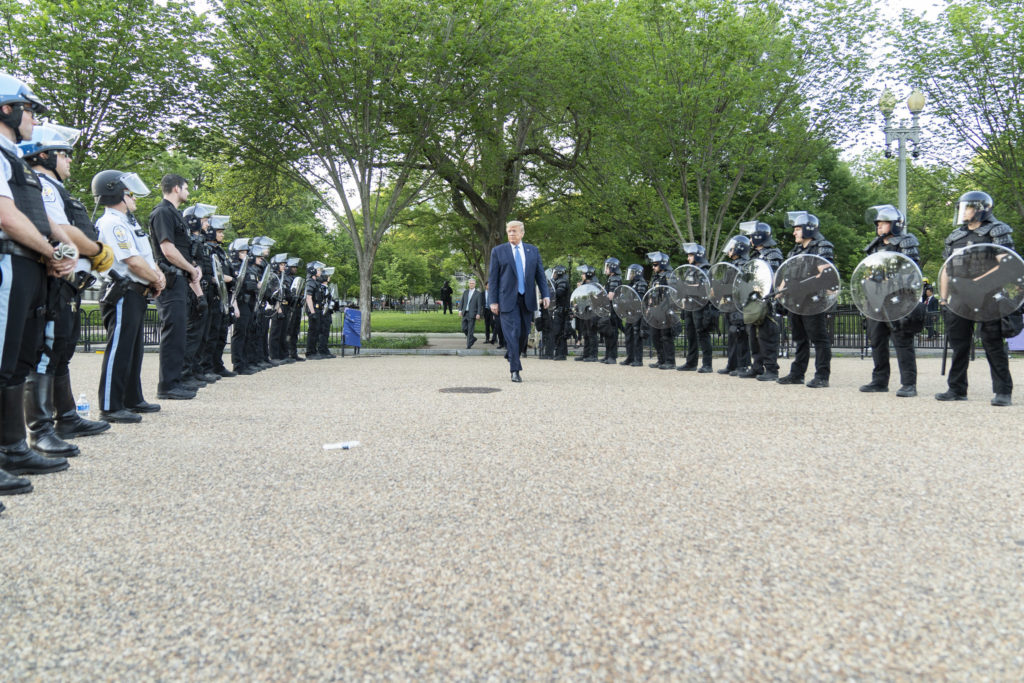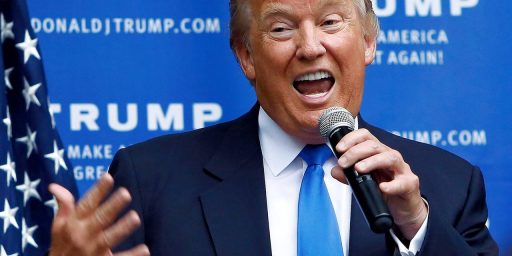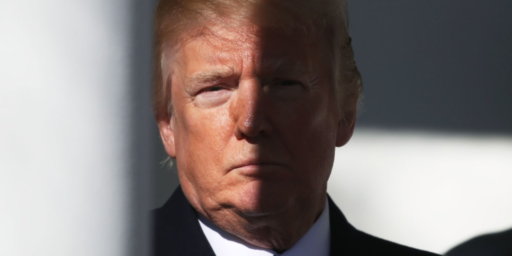Trump and the F-word
Not that one. The other one.

Is Donald J. Trump a fascist? Or, to perhaps be kinder (if one can be kind when using these terms), is he acting in a fascistic manner in response to national protest? I think these are fair questions (and chilling ones to ask about a sitting US president).
Without getting into a long political science discussion of fascism (I did a little bit of that here in 2015) I will say that violent rhetoric and use of force all in the name of a vaguely defined “order” can fairly be described as fascistic. Further, I would say that policies and pronouncements that foster treating citizens as the enemy for the security forces of the government to dominate are fascistic.
So, is it fair to ask the questions above of Trump?
I think these are fair questions when one notes that the photo at the top of this post is one of Trump going to have a photo-op after his government had used security forces to clear Lafayette Square of peaceful protestors. (And it is remarkable that this is one of precious few times in his presidency that a church was even a destination).
I think these are fair questions when we listen to Trump and cabinet members talking on Monday of this week about domination and speaking of our cities as battle spaces:
Trump:
“You have to dominate. If you don’t dominate, you’re wasting your time. They’re going to run all over you, you’ll look like a bunch of jerks. You have to dominate, and you have to arrest people, and you have to try people and they have to go to jail for long periods of time.”
SecDef Esper:
“And so, in my urging I agree, we need to dominate the battle space…resources in the guards. I stand ready the chairman stands ready, the head of the National Guard stands ready to fully support you in terms of helping mobilize the guard and do what they need to do. Again, most of the guard has not been called up. There’s only a few states that…two states where more than 1,000 troops have been called up. I think the sooner that you mask and dominate the battle space, the quicker this dissipates, and we get back to a — the right normal.”
AG Barr:
“Law enforcement response is not gonna work unless we dominate the streets, as the President said. We have to control the streets.”
Dominate, dominate. This is the law and the prophets, according to Donald and his disciples.
It is force over reason.
It is the language of abuse of the citizenry.
One does not need to strain to hear the fascistic ring to it all.
I think these are fair questions when Trump talks about sending the US military into states.
If a city or a state refuses to take the actions that are necessary to defend the life and property of their residents, then I will deploy the United States military and quickly solve the problem for them.
I recognize the appeal to the law and order crowd, but these words are extreme: troops will be deployed in your state and in your cities to attack and put down American citizens even if not requested by governors.
The message is clear: force will solve these problems.
I think these are fair questions when the federal government is deploying law enforcement groups without identification.
No names, no badge numbers, no insignia sum to a license for impunity. This is not a democratic usage of state force. It is the stuff of authoritarianism.
I think these are fair questions when we see video after video of police violence against peaceful citizens because his words encourage those actions. When we see the video of Buffalo police shoving a 75-year-old man to the ground, it is hard not to remember words like these spoken by the President:
“When you see these towns and when you see these thugs being thrown into the back of a paddy wagon, you just see them thrown in, rough, and I said, ‘Please don’t be too nice,’ ” Trump told the audience of law enforcement officers at Suffolk County Community College in Brentwood, N.Y.
“Like when you guys put somebody in the car and you’re protecting their head, you know, the way you put their hand over, like, don’t hit their head and they’ve just killed somebody, don’t hit their head, I said, ‘You can take the hand away, OK?’ “
That’s the rhetoric of abuse. It helps deepen the notion that people accused of crimes are the enemy and that law enforcement officers are in a war against other Americans. And these are the words of the President to the police.
Words matter.
I think these are fair questions when we consider Trump’s history of violent rhetoric aimed at fellow citizens. During the campaign, he constantly used violent rhetoric as I noted in a 2018 post called Radicalizing Rhetoric. Some example from that post:
“Maybe he should have been roughed up, because it was absolutely disgusting what he was doing. I have a lot of fans, and they were not happy about it. And this was a very obnoxious guy who was a trouble-maker who was looking to make trouble.” From an interview on the Sunday edition of Fox and Friends on November 22, 2015 speaking about a black protester at a campaign event in Birmingham, AL. (video here).
“If you see somebody getting ready to throw a tomato, knock the crap out of them, would you? Seriously. Just knock the hell — I promise you, I will pay for the legal fees.” Speaking to a campaign rally on February 1, 2016.
“I’d like to punch him in the face” and “In the old days [protesters would be] carried out on stretchers.” At a campaign event, February 22, 2016.
“You know, part of the problem and part of the reason it takes so long is nobody wants to hurt each other anymore, right?” At a campaign rally to the crowd on March 11, 2016. (roughly 7:30 mark of the video).
“The audience hit back. That’s what we need a little more of.” March of 2016 in response to a black protest being sucker-punched by a supporter as he was being escorted out of a campaign event.
“Hillary wants to abolish, essentially abolish, the Second Amendment. By the way, and if she gets to pick her judges, nothing you can do, folks. Although the Second Amendment people, maybe there is, I don’t know. But I’ll tell you what, that will be a horrible day.” On the campaign trail, August 9, 2016.
Force. Will. Violence. Treating political opponents as enemies.
This is fascistic language.
The disheartening fact is that I could go on. I could talk about his inflammatory rhetoric aimed at immigrants (including the time he “joked” about shooting them). Or the time he praised a co-partisan for assaulting a reporter.
Fascism is an ugly word that has an ugly history. It is not a word I use lightly. It has its origins in Mussolini’s Italy, where the word was embraced, and was applied to Nazi Germany. It is further associated with Franco’s Spain and could arguably be applied to the actions of many Latin American dictatorships such as Argentina and Chile in the 1970s.*
The word is often used imprecisely and as an epithet. I am not using it as an epithet here. I am using it as a reasonable descriptor of what we are seeing on our streets and from the White House.
I recognize that force is part of governing and that force has to be deployed at times, even against citizens. But when force is used, like against that man in Buffalo or in Lafayette Square, as though force is more important than morality, then we are in very dangerous territory.
Indeed, the specific murder of George Floyd, and the deployment of force against African-Americans in general, is fascistic. It says that force trumps right. The entire logic that it is acceptable in any way for the police to dole out a death sentence to a US citizen save in extreme cases is fascistic.
Authority over right (and rights) and submission on pain of death are not democratic values. Order at all costs is authoritarian, not democratic.
And yes order in a general sense is a clear goal of government. And I am not here defending looting or other violence by citizens. It is reasonable for the state to wish to stop criminality. But how it is done matters. And there is no denying that we have seen plenty of examples of law enforcement simply trying to dominate rather than serve and protect. We have seen escalation when the goal should be de-escalation.
And we have seen precious little in terms of addressing the underlying reasons for where we are right now in terms of justice.
George Floyd is dead, in part, because we have been telling law enforcement that they are in a war with crime. And the current rhetorical of domination is just furthering that message from the loudest bullhorn in the land.
I am profoundly concerned that the President of the United States is openly embracing rhetoric and actions that have clear fascistic undertones. And, worse, that his party is not calling him out on it (but, rather, are cowardly looking to the next election knowing that he is their only path to retaining the White House).
And to answer my questions directly, I would not classify Trump as fascist in the full sense of the term (that would require a different conversation and this post is already too long). But, clearly, he and his administration are both acting fascistically and promoting fascistic behavior.
And that assessment is more than bad enough.
*I don’t want to stretch the term too far, and if I were fully defining the regime types of, say, Pinochet’s Chile (1973-1990), I would not call it a fascist regime, per se. However, I would say without a doubt that things like Operation Condor (as a prominent example) were fascistic.






Too me, this is a great example of why the “don’t pay any attention to what he says” crowd is wrong. People do pay attention. They take away an endorsement, an encouragement to be more like that. The bully pulpit is one of the greatest powers of the Presidency.
I wonder if anyone ever took Trump up on his alleged offer to pay all legal bills for someone arrested for roughing up a protester at one of his rallies. Given his penchant for refusing to pay contractors, I would think this would be a risky proposition.
I have long said that support for the contemporary version of Enlightenment values is a minority opinion globally. In western countries it is a majority opinion when the economy is humming along for enough people. I tell my friends, “The war’s not over. We haven’t won.” On bad days I wonder about the geographic scope over which it’s even possible to win.
Certainly proto-fascist. And creeping up the fascometer. Seemingly cranking it up daily this spring.
He wants the power over the state apparatus that Duterte, Putin, and Orban wield. And his party seemingly wants it too.
Purposefully anonymized federal forces marching down DC streets whaling on protesting citizens is fascist. Especially on protests wanting equal treatment under the law.
A point you missed is forcing businesses and corporations to play ball, toe the line, or suffer the consequence. Threatening.
Also threatening states, counties, and cities to comply or else.
Last week was chilling.
I would note that what I see in the news is mostly cities and police departments deescalating, conspicuously NOT “dominating the battlespace”, with salutary results.
@gVOR08:
Big cities get that willful provocation will escalate.
As the first example Minneapolis Mayor and Hennepin County DA acted swiftly and seemingly correctly in firing and charging that cop and his lackies.
Had they not, things would have been very ugly. Much, much worse.
@Jay L Gischer:
You’re absolutely right. The business about not taking Trump literally but seriously (first articulated by Salena Zito, I believe) may have been an attempt on the part of some of his more fastidious supporters to excuse, or ameliorate, his boorishness by in effect claiming that he didn’t really mean the appalling things he said; he was just blustering for effect.
Clearly, though, many Trump supporters took him literally and delighted in his oafishness and bigotry. For them, it was a feature and not a bug.
If the polls stay like this, I can easily see a combo of Trump, RW propaganda, and police departments going all-in on voter fraud and attempting to shut down the ability to vote. Like in the city of Detroit, having two heavily-guarded polling stations or some shit.
What happens? Here’s Dave Schuler, reliably sleazy bootlicker, talking about how to enforce good old law and order:
I don’t believe there’s any practical way of preventing a massive angry demonstration from changing into a riot with dizzying speed. All it takes is one “influencer” shouting “Let’s start looting!” Set aside “free speech zones” for demonstrations far away from tempting targets and be willing to enforce order. Even that won’t be enough.
Trump’s base always been thick-necked proles filled with anger at anything–black people, hipsters, academics, journalists. People like Dave Schuler were made to be used; their little squalid resentments were preformed by their trash parents to be triggered by Trump. I can easily see Trump using the police while the military and the Republican establishment shrugs. After that, it’s an attempt to rule by the fucking pathetic and the fucking crazies–the Opus Dei freaks like Bill Barr or Rod Dreher. It’s partly comical–depends on how you view being stuck in a prison camp where you have to listen to 24/7 Rod Dreher speeches about the tyranny of the pink police state.
I thought US righties were pro-states’ rights.
Were appalled and terrified that feds could possibly march in and trample on the Bill Of Rights.
Turns out they are fine with it if it is applied to black folks and liberals. Whoever could have guessed that?
As long as the knee of the state is not crushing their wind-pipe, they want the state to subjugate their internal enemies by any means necessary.
This essay is powerful. Thank you Steven.
@Modulo Myself:
And I thought I disliked Dreher’s boot-licking shtick!
I’ve been reluctant to apply the label to a democratically-elected politician operating in a system with robust check and balances. But I came to the same conclusion Tuesday for similar reasons.
@de stijl:
It’s dislike, but he’s such a wreck. I mean he is rightfully panicking about the timeliness of his Gay = Soviets book which is coming out in the fall. But his basic logic has always been Get A Load Of These SJW Weirdos followed by I’m Off To An Exorcism. With people like Dreher or Dave Schuler you have to suspect something amiss in their psyches. But it’s not worth going into further.
Thinking of Adorno going off on how clever people have always made it easy for the barbarians:
One of the lessons of the Hitler period is the stupidity of cleverness. How many were the expert arguments with which Jews dismissed the likelihood of Hitler’s rise, when it was already clear as daylight. I recall a conversation with an economist who demonstrated the impossibility of Germany’s militarization from the interests of Bavarian brewers. And in any case according to the clever people fascism was impossible in the West. Clever people have always made things easy for the barbarians, because they are so stupid.
Anyway, getting ready to violate ‘curfew’ tonight and telling the NYPD to suck my dick. It’s unfortunately very hot and my youngish middle-aged white fears are aligned with getting arrested and having no water or having had too much water and needing to take a piss. A week ago, I was upstate living a gentry life. Now there are police helicopters hovering everywhere.
Barr is a serious threat to civic governance.
If the DOJ is a button the current resident of the White House can push and get the requested response things are very fucking seriously awry.
@Modulo Myself:
Yes. Thanks for that. You don’t have to be clever..or even right..after you’ve dominated the battle space. Might doesn’t make right but it renders right moot. Fascism seems to be the only word we have for this. It will do, but it’s also unfortunate as it drags in a lot of history which may or may not be fully relevant to each and every time it’s the MO.
@Modulo Myself:
Dreher’s psyche is intriguing. He’s burned through three faith practices and hates the Rennaisance.
But if a kid at Oberlin said something provocative, it’s 10,000 words on the evils of liberal SJW fascism.
I prefer Umberto Eco’s definition of fascism. His main observation is that fascism is not an ideology, but rather a way of looking at the world that can spring up in any particular ideology, which is why it’s so hard to pin down: there have been wildly incompatible fascist movements
His 14 characteristics of the fascist worldview are:
13 of the 14 apply to Trumpism (I’d say only #9 is not really a characteristic of Trumpism)
@Modulo Myself:
Some people were upset when I referred to Dave Schuler as a Good German.
The notion that all it takes is one influencer yelling, ‘unleash the dogs of war’ shows profound ignorance of human behavior, and both racial and generational contempt for people he sees as less than himself or people like him, who would of course not be so easily led into mob violence.
Let’s just ignore the fact that millions have marched while at best thousands have looted. Let’s also ignore the fact that over time the demonstrations have become less violent, not more. I suppose we’ve run out of influencers yelling, ‘let’s riot!’ I mean, the only other possible conclusion is that the protesters and the rioters are not the same people, that there were handfuls of looters who drew all the cameras while the vast majority were unmoved by calls for mayhem.
The people rioting now are police.
“Law and order” is 100% about order and 0% about law.
@Modulo Myself:
If you want to take a night off, the kids got this covered hard.
If you want to represent, do so.
Hit me up if you need bail money tonight. I’ll pitch in.
@Michael Reynolds:
You’re right on all accounts. About Dave, and about the police. Personally, I can’t imagine the police here are going to come back from this. I was at a protest Wednesday that escalated and the violence was so illogical and so unprovoked, and on the side of good nobody is backing down at all.
@de stijl:
Thanks. I’m good money-wise and the bail funds in NYC are asking people to donate elsewhere.
Nice essay.
Everything we’re seeing in this context is just an extension of Trump’s sociopathic personality. As we all know, he’s cruel, doesn’t care about other people, and focuses on his own image. He’s surrounded himself with like-mind people, or at least people who go along. A substantial number of people have a little bit of Trump in their psyche, and he’s been encouraging it.
One man in this country shouldn’t have this much power. It’s helpful when a good person is in the role (most past presidents), but it’s dangerous when an evil buffoon is.
@Modulo Myself:
Dreher cannot stop self-promoting his books. It’s creepy.
I tried scanning through his most recent post and Crikey freaking obsessional Moses that was a not well take!
I dip in every month or so, but why? Need to stop.
His is a path I am never, ever going to wander down. Not worth the attention and effort.
Overall, I’ve never gone in for demonstrations. The uber-lefty Occupy/anti-war stuff always left me cold. These have changed me. I can’t get over how good some of these organizers and how good at speaking they are. There’s none of the lefty let me summarize my dissertation as everybody listening becomes bored. These are young people and people of color, and they are fucking dazzling and bold.
@Stormy Dragon:
Adding on to my last comment: a common thread running through the 14 criteria is that Fascism is a militant form of irredentism, the idea that society existed in a perfected state at some point in the past, that all of its problems are a result of being in a fallen state after rejecting this perfected state, and that the only way they can be fixed is by restoring the previous perfected state.
@de stijl:
This is, perhaps, the right term.
@James Joyner: That is a deeply peculiar hurdle for reluctance as the classic fascists began as elected leaders, and leveraged conservative parties namby pambyism in seeing the threat.
Of course the robustness of your checks and balances is a questionable assumption given how Trump has revealed how flimsy they are operationally. I would say you’ve been rather more protected by his laziness, lack of follow through and incompetence than supposed checks.
Indeed if you have a take away, it is that your political culture, weakness or narrowness of buy-in to informal limits make it imperative to fix the very non robustness of applied checks and balances.
.@Stormy Dragon: the fourteen points seem well placed and taking irredentism as the summary, one can see core Trumpist support as a kind emerging fascistic response of the White population that feels culturally and politically threatened by social change including dissolving old racialist norms.
@Modulo Myself:
These amazing kids know this in their hearts.
I had to see a lot of it before my brain kicked in and saw the pattern and reconciled it and reckoned with it.
The tradition of deferring to authority and let the process play out is no longer the default reaction in them. Good!
That system was a bad system meant to protect the wealthy and privileged.
It heartens me we raised such cool kids concerned about justice and equal treatment.
They don’t need us. They got this. I like to represent too, but they are way better at this than I am.
@Lounsbury:
I always feel the need to point out that Hitler did not win election. He was appointed Chancellor after having lost the presidential election to von Hindenberg.
@Stormy Dragon: the fourteen points seem well placed and taking irredentism as the summary, one can see core Trumpist support as a kind emerging fascistic response of the White population that feels culturally and politically threatened by social change including dissolving old racialist norms.
@James Joyner:
I did notice that reference in your post and the whole thing has been on mind since he started calling for troops in the streets and especially after the whole “dominate” business.
I would note, of course, that his election was problematic but constitutional. However, I would note that despite what the textbooks say, we dont’ have robust checks and balances–and that was true before Trump, but he does underscores the fact more than do his predecessors.
@Steven L. Taylor: Yes Hitler did not win Chancellorship but that is not the point. The Nazis in the context of the Weimar system did quite well in standing for elections, the results of which they leveraged up.
It thusly makes little sense to pose a democratically elected post as excluding a fascist nature of a politician.
@de stijl:
Good points, with one quibble:
“A point you missed is forcing businesses and corporations to play ball, toe the line, or suffer the consequence. Threatening.
Also threatening states, counties, and cities to comply or else.
Last week was chilling.”
It’s been around far longer than a week. It was very clearly on display throughout his handling of coronavirus, but it has been there from the start.
@Moosebreath:
Replace with:
“Last week was especially chilling.”
I like that better anyway.
Trumpism may not yet be fascist, but it’s not hard to imagine a world in which Trump tries to take the remaining steps to qualify as a full-blown fascist. One thing the fascism of Mussolini and Hitler had in common was the cult of personality that surrounded and supported them. I’m not asking to reignite the recent partisan vs. cult debate, but I do think we’ll get some very interesting data on whether Trump’s support is normal partisanship or something more cultlike as we see how his supporters respond if his actions become increasingly fascist. The response of rank and file supporters to criticism of Trump by people they formerly honored, like Mattis, is not encouraging.
@Roger:
It is noteworthy that Mattis received a lot of support from his peers and no reported pushback from that same group that I saw.
The pushback came from Trumpist pols and the usual GOP hacks.
@Lounsbury: Not to get into any of the criticisms back and forth from another recent thread… But: Mussolini rose to power in ’22 after a ‘March on Rome’ that resulted in a straightforward armed coupe d’ etate. And Hitler was appointed from a minority in the Reichstag never having won an election. And Senior Franco never appealed for Spanish votes. I bet I could go on.
To me the chilling ugliness is that these people were never ever the result of conventional politics. Their appeal was that “normal politics” was insufficient to solve current problems.
When a significant minority believes THAT, buckle your seatbelts ladies and gentlemen.
(Edit: Hit ‘comment’ and immediately 100 things to add crowd my mind! One supplement: Whether the Trump crowd are fascists will become clear if they lose in Nov. What would Mussolini, Hitler, Franco etc have done if they’d somehow been forced to face an electorate and lost? Humm. Do you think they’d tuck their tails under their bellies and hope for better luck next time? If Trump loses — do we actually think he’s going to exit the WH? Michael Cohen and I both think that’s not going to happen. And then we’ll be able to say “Hey! It’s confirmed! He’s a fucking Nazi!”
And with any luck, someone will shoot them.
The bugaloo demons out there want to provoke a race war.
Instead this will result in more inclusion and unity and a sustained policy on combatting over-policing in all its forms.
Karma rules!
@de stijl: Righties have always been in favor of righties’ rights. Support of States’ Rights was merely the means by which they would seek to advance their goal.
It’s very much the same as General Motors. For GM, manufacturing cars was the means by which they advanced their actual goal of making money. In fact, there was a period in the 80s and 90s when GMAC (the finance division) was so much more profitable than the manufacturing divisions that they sold cars at a loss provided that people would finance them through GMAC. Righties are just as dedicated to the same principle–they can get righties’ rights without support for states’ rights, or even individuals’ rights, so such ideals are no longer useful. I expect that they will abandon libertarianism any day now.
I’m not so sure about that…it does appear that part of Trump’s schtick is having an enemy to rally against, much like with the modern GOP and their form of “conservatism”…the coastal elites, the liberal university professors, the MSM, minorities of all sorts…without these enemies to fight against, what’s the point? Why not just declare victory and go home? Part of their whole reason for existing seems to be to constantly have enemies to fight against…
@Steven L. Taylor: I’d go with Wannabe Fascist. He has the desire, just like he wants to dominate, he’s just too feckless to pull it off. Barr, on the other hand…
@gVOR08:
Wannabe Mussolini or vice versa rhymes better.
Plus he does that weird-ass chin jut head up thing.
Dollars to donuts, Roy Cohn taught him that move.
@de stijl:
““Last week was especially chilling.”
I like that better anyway.”
Fair enough.
@An Interested Party:
He does want an enemy to rally against, but it seems more based on #3, #4, #11, and #12 than on #9. He and his followers seem to have more of a “fortress America” view of things than a “pax America” view, and when they do talk about wars, they always seem to think they’re ones that will be ended almost instantly. I don’t really see a Trumpist desire for a “forever war” in the way other fascist regimes have.
Seen on Twitter:
“Who the fuck wants four more years of this?“
Stupid people with shitty values do.
@Stormy Dragon:
They want movie wars against pushover patsies.
The military equivalent of TV wrestling with us the face (obvs) and some pissant swarthy shithole as the heel.
And glorious triumphal parades to stick it in the nose of those peace loving libs.
Who said America isn’t on Rome’s path?
The arena was the precursor to tv wrestling. Grubhub and Hulu are the new bread and circuses. Foreign wars in barbarian lands where we always win unless our hands are tied by the perfidious traitors are the frontier wars.
Plus literal fascia.
Thankfully Trump is hugely lazy. Bigly.
8 am to noon – “Executive Time”
12 to 1:30 – lunch with toadies and yes-men
1:30 to 3 -space out thinking about Hope Hicks while pretending to watch the PDB vid the CIA dumbed down for you. Yell at henchmen.
3 to 6 – rage watch Fox News
6 to bed – rage tweet, call Hannity for advice
Were he an actual blackshirt he would chair the social committee and have a lackey do the job and yell a lot at her for screwing up the cheese plate. No actual street fighting.
Thankfully our brush with fascism was under one of the most brazenly lazy men alive.
@Lounsbury:
That’s not true. Yes, both Hitler and Mussolini had classic, democratic titles (Chancellor and Prime Minister). But both came to power in putsches.
That’s decidedly true. The system is not built to sustain rabid partisans that put the party over the country.
@Steven L. Taylor: Yes. And Mussolini was appointed by the king pursuant to the March on Rome.
@Steven L. Taylor:
They’re pretty robust if executed. Nixon turned over the tapes after the Supreme Court unanimously ordered him to and promptly resigned. That was out of respect for the institutions but also because it was clear Republicans in Congress would no longer back him.
But it’s been true for a while, as you’ve noted, that it’s practically impossible to remove an impeached President. It would have been possible in Nixon’s case only because rank-and-file Republicans were turning on him.
Trump has, thus far, mostly acceded to court orders. But Senate Republicans have been lockstep even by usual partisan standards.
@James Joyner: Which is why we have to vote them out. All of them. A lack of respect for the workings of law is no basis for a Senator, IMHO. Either be a Freedom Fighter (TM) or be an elected member of the government; you can’t be both.
@James Joyner: Shelf life nears it’s end, but on the subject of ‘robust checks and balances’ there is one thing to add. The most recent administration (the Obama one, does anyone remember?) certainly encountered very robust checks and balances.
Those ‘checks’ are certainly much stronger when administrations are free to give testimony to congress — or not. Depends on how they’re feeling that day and whether someone’s precious ox might be gored.
Considerable ‘balance’ needed.
@James Joyner:
Since under the Weimar regime, the post of Chancellor was an appointed and not elected position it’s a rather empty point to make, no Weimar Chancellar was elected, wasn’t the system. American system centrism aside, very simply the Nazi party was, under the fragmented Weimar parliamentary system, from 1930 forward the largest and generally most influential elected party and the party leadership had seats – broadly speaking they were elected leaders and Hitler’s arriving at the always appointed Weimar Chancellorship was in large part based on his parliamentary power (not exclusively to be sure but non trivially either). The point being, to be elected under a democratic system is in no way something that disqualifies as fascist, your observation being weird and irrelevant.
They’re pretty robust if executed.
Is rather like saying the Maginot Line strategy was robust if not for the Ardennes.
The practical application is what counts and if there is a break-down in the system that allows for that, then they’re not robust, really.
The ability to remove Inspectors General illustratively and the effective impossibility of oversight rather puts on display actually a fundamental non-robustness of the system as it operates in reality.
@James Joyner:
We are approaching 50 years since Nixon and the party system has evolved since then and partisan power across branches is more powerful than textbook check and balances. Further, the Senate is even more unrepresentative now that it was in the early 1970s, and the Senate is the gateway to the judiciary.
Checks and balances are not self-executing and rely* far more on party than the textbook model understands.
I could go on. But the basic point is that the model itself isn’t especially democratic (the EC and the Senate specifically, but the House has issues as well). The nomination process is a lousy gatekeeper, so I think it is actually quite possible for a real fascist, let alone a proto one like Trump to get elected in our system and then have checks and balances not protect us so long at that president had control of at least one branch of Congress–and really, so long as the opposition did not have a filibuster-proof majority in the Senate.
*Edit: I typed “really” instead of “rely”
@James Joyner: Thanks. That was my general recollection, but I just stuck with Hitler because the facts were off the top of my head and I was too lazy to confirm Mussolini’s exact history.
@Lounsbury: The problem is, appointed not elected undercuts your initial claim of “the classic fascists began as elected leaders, and leveraged conservative parties namby pambyism in seeing the threat.”
I wrote a long post about this, I will see if I can find it.
But my fundamental point is this: people often use these cases, especially Germany, as a cautionary tale of how democracy can go off the rails when charismatic people get elected. But that isn’t what happened in either case and democracy itself was pretty much falling apart in Germany in specific. At least three parties (the Nazis, the communists, and the monarchists) were all anti-regime parties (they literally wanted to replace the existing governmental structure). It was a system on the brink of collapse, Hitler or no.
Here’s the post.
A key passage: